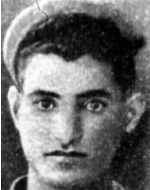Nefran, Yosef (Yoske)
Son of Gina and Moshe, was born on January 3, 1926, in the city of Ma’afar, Yemen. In 1943 he left for Aden, the first stop on his way to Israel. In the camp in Aden, he served as a food distributor and liked this position for everything. After a year of hardships in the camp, he immigrated to Israel in 1944 and settled in Rishon Letzion where he worked in agriculture, mainly in orchards. The earthwork did not frighten him because he was still in his youth when he was in Yemen. Afterward he worked in Ma’aleh Hahamisha. In 1946 he joined the Haganah and fulfilled his duties faithfully. After the establishment of the State of Israel, he joined the army, served in the Alexandroni Brigade, fought in battles in the central region, and was later transferred to the south. When he came to visit his wife and children, he did not spend much time in the house and would return immediately to his position in the army, although he missed them very much, especially to his little son who was born in those days. His commander testified that he was a fearless fighter who was diligent in training and excelled in field exercises. The last battle he fought in Iraq was al-Manshiyya. During Operation Horev, a “liquidation” operation was carried out against the “Faluja pocket,” in which an Egyptian brigade was besieged. The attack took place on the eastern flank of the “pocket” in the area of Iraq al-Manshiyya. The Alexandroni forces broke into the village from the south and took over part of it, but their assault on the hill north of the village was repulsed. Meanwhile, the Egyptians recovered and attacked and forced our forces to withdraw. Part of the force was trapped inside the village. In this battle he fell on the 28th of Kislev 5709 (December 28, 1948). When all the members of his company fell one by one, he bravely acted in the “Fiat” and did not abandon his position until the last moment. His commander called him to withdraw, but he refused and continued to fight the enemy until he was hit and killed. He was buried in Faluja. He left a wife, Margalit, and two children. On the 17th of Kislev 5710 (8.12.1949) he was transferred to the eternal rest of the military cemetery at Nahalat Yitzhak.
